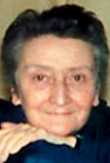 Dear William,
Dear William,There are so many memories and meetings with the late Fr. Stephen.
One centres on the find of the Blessed Jacinta picture.
And today ICN prompted us that
Tomorrow we celebrate:
Blessed Jacinta and Francisco Marto (20 Feb).
Thank you for the conversation with Fr. Stephen;
"He loved 'best' the story of a young cowherd who had learnt to say those opening words, 'Our Father', a story that is told in the book "My Vocation is Love", Jean Lafrance, on St Therese of Lisieux."
I wondered where the book had disappeared. It did not appear in the shelves on SAINTS. After a couple of days later, there the book in the SPIRITUALITY category in the main Library.
As the coin found in the Gospel, it is all more valued to find "My Vocation Is Love."
Yours ...
Donald
+ + + + + + +
----- Forwarded Message -----
From: William ...
To: Donald ...
Sent: Monday, 11 February 2013, 18:52
Subject: Today and always
From: William ...
To: Donald ...
Sent: Monday, 11 February 2013, 18:52
Subject: Today and always
Dear Father Donald,
...
Goodness - what a distressing time it has been for the Community....
The very sad goodbyes to dear Father Stephen will have been made. I stood beside you all at the time of the ceremony - the grave preparation photo providing the exact location. I have beside me a photo of him, and his later letters and his delightful 'scribbles' - which, when placed in order, are found to be truly deep and meaningful. It will be in the refectory in particular that you will all look after his place. ...
Your dream of the young face of Jacinta, identified to you these days later in the prayer card in Fr Stephen's missal quite fascinates me. I believe this to be most remarkable - the vision of the face of an angel. It quite absorbs me....
I recall his great delight in the appearance of Our Lady at Fatima, to which he often made reference. I think it had much to do with his identification to the innocent trusting faith of a child.
He loved 'best' the story of a young cowherd who had learnt to say those opening words, 'Our Father', a story that is told in the book "My Vocation is Love", Jean Lafrance, on St Therese of Lisieux. Fr Stephen wrote in my copy: "Page 123 How we had a good holy laugh over that! Fr Stephen" - the passage he was referring to begins with a question to St Therese: "What are you thinking about?" She replied, "I am meditating on the Our Father. It is so sweet to call God our Father!" The entry adds "... and there were tears in her eyes". And there were in Fr Stephen's. The story of the cowherd follows, and he wept with delight as he read it to me. The story is introduced with a narrative: "This story could be applied to Therese and to all those little ones to whom the mysteries of the kingdom are revealed".
Your retreat will be underway. I wonder what the theme will be... Fr Farrell arrives with the community rising from a frightful bout of illness, to the funeral of one its members, within the week of the start of Lent. There is much of significance there for a retreat topic, indeed. I hope you will all be able to find refreshment and rest within the context.
Thank you for sharing with me - and for allowing me to share with you - in the sad event of Fr Stephen's death. I remember with such affection the ribbing and teasing between the two 'Stephen's' when they stood beside each other: Br Stephen with his eyes twinkling, Fr Stephen throwing back his head in laughter! Good, good memories.
Thank you Father.
With my love in Our Lord,
William











